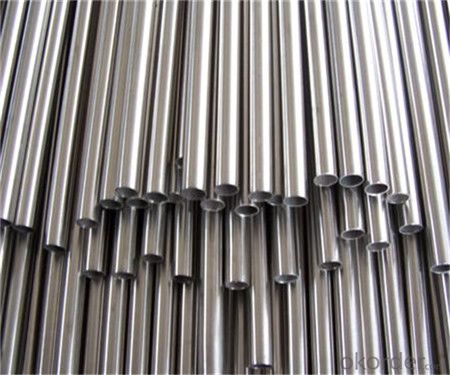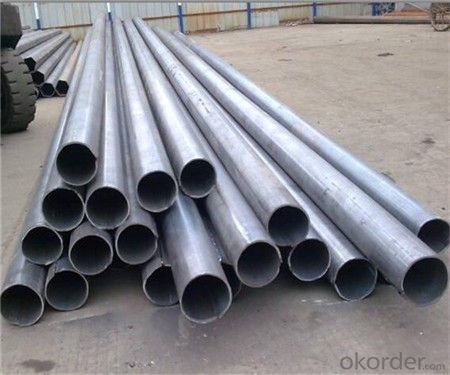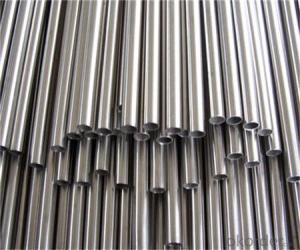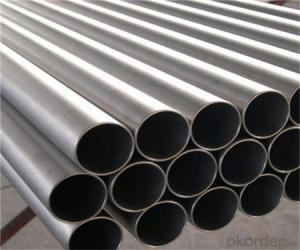Professional Welded Steel Tube/Pipes famous company
- Loading Port:
- Tianjin
- Payment Terms:
- TT OR LC
- Min Order Qty:
- 30 m.t.
- Supply Capability:
- 9000 m.t./month
OKorder Service Pledge
OKorder Financial Service
You Might Also Like
Product Description:
1、Structure of Welded Steel Tube ASTM DIN1829:
Welded Steel Tube is formed by drawing a solid billet over a piercing rod to create the hollow shell. We are company that have many years experience and professional manager team and engineer team and sales team, sure we will provide you high quality of welded pipe and professioanl service.
2、Main Features of the Seamless Pipe ASTM DIN1829:
• High manufacturing accuracy
• The higher strength
• The small inertia resistance
• Strong heat dissipation ability
• Good visual effect
• Satisfy price
3、Seamless Pipe ASTM DIN1829 Specification:
Standard | GB, DIN, ASTM ASTM A106-2006, ASTM A53-2007 |
Grade | 10#-45#, 16Mn 10#, 20#, 45#, 16Mn |
Thickness | 8 - 33 mm |
Section Shape | Round |
Outer Diameter | 133 - 219 mm |
Place of Origin | Shandong, China (Mainland) |
Secondary Or Not | Non-secondary |
Application | Hydraulic Pipe |
Technique | Cold Drawn |
Certification | API |
Surface Treatment | factory state or painted black |
Special Pipe | API Pipe |
Alloy Or Not | Non-alloy |
Length | 5-12M |
Outer Diameter | 21.3-610mm |
Grade | 20#, 45#, Q345, API J55, API K55, API L80, API N80, API P110, A53B |
Standard | ASME, ASTM |
4、Packaging & Delivery
Packaging Details: | seaworthy package,bundles wrapped with strong steel strip |
Delivery Detail: | 15-30days after received 30%TT |
5、 FAQ of Welded Steel Tube Steel Pipes:
①Quality
Our products are manufactured strictly according to national and internaional standard, and before delivered out we always take a test
on every pipe . If necessary we could provide our quality certifications and all kinds of testing report,.
Guaranteed: If products’ quality don’t accord to discription as we give or the promise before you place order, we promise 100% refund.
②Price
we are factory and be able to give you lowest price below market one, and we have a policy that “ for saving time and absolutely honest business attitude, we quote as lowest as possible for any customer, and discount can be given according to quantity”,if you like bargain and factory price is not low enough as you think, just don’t waste your time.Please trust the quotation we would give you, it is professional one.
Why us?
We can provide both low price and good quality especially we are belong to national company could provide you the best sell-after service .Additionally, we can also offer professional products inquiry, products knowledge train(for agents), smooth goods delivery, exellent customer solution proposals.Our service formula: good quality+good price+good service=customer’s trust
Our Advantages:
1) Fast Delivery: lot of high quality steel pipe in stock lot of factory to produce
2) Quality Assured: Strictly acc. To International standard with System ISO certification
3) Good Service: supplied professional technical guide free of charge at anytime;
4) Reasonable Price: to be better support your business;
SGS test is available, customer inspection before shipping is welcome, third party inspection is no problem.
images of products:


Looking forward to doing the corporation with you
Any question, kindly feel free to contact us !
- Q:What are the quality control measures for steel pipe manufacturing?
- Quality control measures for steel pipe manufacturing include various inspections and tests to ensure the pipes meet the required standards and specifications. Some common quality control measures include visual inspections for surface defects, dimensional checks to ensure accurate size and length, ultrasonic or magnetic particle testing for detecting internal or surface defects, hydrostatic testing to check for leaks or weaknesses, and chemical analysis to verify the composition of the steel. Additionally, adherence to proper manufacturing processes, documentation of procedures, and regular audits are also part of quality control measures in steel pipe manufacturing.
- Q:What is the thickness of steel pipes?
- The thickness of steel pipes can vary depending on the specific application and type of pipe being used. Generally, steel pipes come in a range of thicknesses, which are measured in terms of their schedule or wall thickness. The most common schedule for steel pipes is Schedule 40, which has a standard wall thickness. However, thicker pipes with higher schedules, such as Schedule 80 or Schedule 160, are also available for applications requiring greater strength or pressure resistance. Additionally, the thickness of steel pipes can also be customized based on specific project requirements.
- Q:What is the shear strength of steel pipes?
- The shear strength of steel pipes can vary based on a variety of factors including the grade and thickness of the steel, as well as the manufacturing process and any additional treatments or coatings applied. Steel pipes generally possess a high shear strength due to the inherent strength of steel as a material. Determination of shear strength is typically achieved through testing and can range from 50,000 to 80,000 pounds per square inch (PSI) for common grades of steel pipes. However, it is important to acknowledge that the shear strength can be considerably higher for specialized or higher-grade steel pipes that are specifically designed for applications such as offshore drilling or high-pressure systems. Therefore, it is advisable to refer to the manufacturer's specifications or engineering standards for precise and specific shear strength values for a particular steel pipe.
- Q:Are steel pipes resistant to vibration?
- Yes, steel pipes have excellent resistance to vibration due to their high strength and stiffness properties. The inherent rigidity of steel makes it highly resistant to the effects of vibration, making steel pipes a reliable choice for applications where vibration is a concern.
- Q:How do steel pipes differ from other types of pipes?
- Steel pipes possess several distinct characteristics that set them apart from other pipe types. Primarily, their strength and durability are well-known. They exhibit remarkable resistance to heat, pressure, and corrosion, rendering them suitable for numerous applications. Additionally, their robustness allows them to bear heavy loads and offer an extended service life. One distinguishing feature of steel pipes lies in their versatility. They can be manufactured in various shapes and sizes to fulfill specific project requirements. This adaptability has contributed to their popularity across a diverse range of industries, including construction, oil and gas, water treatment, and manufacturing. Moreover, steel pipes exhibit exceptional thermal conductivity, facilitating efficient heat transfer between different areas. Consequently, they prove suitable for applications involving heating and cooling systems, as well as the transportation of hot fluids or gases. Furthermore, steel pipes are renowned for their resistance to fire. They possess a high melting point and are not easily ignited or conducive to the spread of flames. This characteristic is particularly critical in applications where fire safety is a concern, such as buildings or industrial facilities. Lastly, although steel pipes may entail a higher initial cost compared to other pipe types, their long-term benefits, such as durability and low maintenance requirements, often outweigh the initial investment. Additionally, steel pipes are highly recyclable, making them an environmentally friendly choice. In summary, steel pipes stand out due to their strength, durability, versatility, excellent thermal conductivity, fire resistance, and recyclability. These remarkable qualities establish steel pipes as the preferred option for a wide range of applications across various industries.
- Q:Can steel pipes be used for transporting gases and liquids?
- Yes, steel pipes can be used for transporting gases and liquids. Steel pipes are commonly used for this purpose due to their durability, strength, corrosion resistance, and ability to withstand high pressures. Additionally, steel pipes are versatile and can be customized to meet specific requirements for different types of gases and liquids.
- Q:How are steel pipes classified based on their schedule?
- Steel pipes are classified based on their schedule, which refers to the wall thickness of the pipe. The schedule classification system includes different numbers such as 5, 10, 40, 80, etc., which indicate the thickness and strength of the steel pipe.
- Q:What are steel pipes?
- Steel pipes are cylindrical tubes made from steel that are used for various purposes, such as transporting fluids and gases, structural applications, and construction projects. They are known for their durability, strength, and resistance to corrosion, making them a popular choice in industries such as oil and gas, plumbing, and infrastructure development.
- Q:What are the main types of steel pipe ah? How to judge which kind of steel pipe performance is better?
- Sort by connectionThe connection way of steel pipe can be divided into: light pipe (pipe end without thread) and wire tube (Guan Duan with thread).The tube can be divided into ordinary tube and end tube.Thickening of the tube can also be divided into: extra thick (with external thread), internal thickening (with internal thread) and inside and outside thickening (with internal and external thread) and other vehicle wire tube.The wire tube can also be divided into ordinary cylinder or taper thread and special thread.In addition, according to user needs, wire tubes are generally equipped with pipe delivery.Plating characteristicsAccording to the characteristics of surface coated steel pipe can be divided into: Clarinet (not coated) and coating tube.The coating tubes include galvanized pipes, aluminium plated tubes, chrome plated pipes, aluminized tubes and other alloy layers.The coating tube has an outer coating tube, an inner coating tube and an inner and outer coating pipe. The commonly used coatings are plastics, epoxy resins, coal tar, epoxy resins, and various glass based anticorrosive coatings. Galvanized pipe is divided into KBG pipe, JDG pipe, threaded pipe, etc.
- Q:How do you calculate the pipe head loss for steel pipes?
- To calculate the pipe head loss for steel pipes, you can use the Darcy-Weisbach equation. This equation relates the head loss (hL) to the flow rate (Q), pipe diameter (D), pipe length (L), fluid density (ρ), fluid velocity (V), and a friction factor (f). The formula is as follows: hL = (f * (L/D) * (V^2))/(2g) Where: - hL is the head loss (measured in meters) - f is the friction factor (dimensionless) - L is the pipe length (measured in meters) - D is the pipe diameter (measured in meters) - V is the fluid velocity (measured in meters per second) - g is the acceleration due to gravity (usually taken as 9.81 m/s^2) The friction factor (f) depends on the Reynolds number (Re) of the flow, which is a dimensionless quantity representing the ratio of inertial forces to viscous forces. The Reynolds number can be calculated as: Re = (ρ * V * D) / μ Where: - Re is the Reynolds number (dimensionless) - ρ is the fluid density (measured in kg/m^3) - V is the fluid velocity (measured in meters per second) - D is the pipe diameter (measured in meters) - μ is the dynamic viscosity of the fluid (measured in Pa·s or N·s/m^2) The friction factor (f) can be obtained from empirical correlations or from Moody's diagram, which relates it to the Reynolds number and the relative roughness of the pipe surface. By substituting the calculated friction factor (f) and other known values into the Darcy-Weisbach equation, you can determine the head loss in the steel pipe. It is important to note that the head loss is a measure of energy loss due to friction and other factors, and it is typically expressed in terms of pressure drop or height difference.
1. Manufacturer Overview |
|
|---|---|
| Location | |
| Year Established | |
| Annual Output Value | |
| Main Markets | |
| Company Certifications | |
2. Manufacturer Certificates |
|
|---|---|
| a) Certification Name | |
| Range | |
| Reference | |
| Validity Period | |
3. Manufacturer Capability |
|
|---|---|
| a)Trade Capacity | |
| Nearest Port | |
| Export Percentage | |
| No.of Employees in Trade Department | |
| Language Spoken: | |
| b)Factory Information | |
| Factory Size: | |
| No. of Production Lines | |
| Contract Manufacturing | |
| Product Price Range | |
Send your message to us
Professional Welded Steel Tube/Pipes famous company
- Loading Port:
- Tianjin
- Payment Terms:
- TT OR LC
- Min Order Qty:
- 30 m.t.
- Supply Capability:
- 9000 m.t./month
OKorder Service Pledge
OKorder Financial Service
Similar products
New products
Hot products
Hot Searches
Related keywords






























